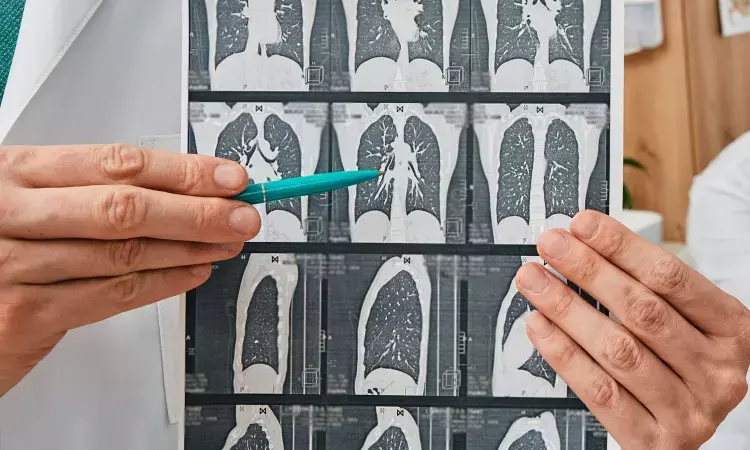- Home
- Medical news & Guidelines
- Anesthesiology
- Cardiology and CTVS
- Critical Care
- Dentistry
- Dermatology
- Diabetes and Endocrinology
- ENT
- Gastroenterology
- Medicine
- Nephrology
- Neurology
- Obstretics-Gynaecology
- Oncology
- Ophthalmology
- Orthopaedics
- Pediatrics-Neonatology
- Psychiatry
- Pulmonology
- Radiology
- Surgery
- Urology
- Laboratory Medicine
- Diet
- Nursing
- Paramedical
- Physiotherapy
- Health news
- Fact Check
- Bone Health Fact Check
- Brain Health Fact Check
- Cancer Related Fact Check
- Child Care Fact Check
- Dental and oral health fact check
- Diabetes and metabolic health fact check
- Diet and Nutrition Fact Check
- Eye and ENT Care Fact Check
- Fitness fact check
- Gut health fact check
- Heart health fact check
- Kidney health fact check
- Medical education fact check
- Men's health fact check
- Respiratory fact check
- Skin and hair care fact check
- Vaccine and Immunization fact check
- Women's health fact check
- AYUSH
- State News
- Andaman and Nicobar Islands
- Andhra Pradesh
- Arunachal Pradesh
- Assam
- Bihar
- Chandigarh
- Chattisgarh
- Dadra and Nagar Haveli
- Daman and Diu
- Delhi
- Goa
- Gujarat
- Haryana
- Himachal Pradesh
- Jammu & Kashmir
- Jharkhand
- Karnataka
- Kerala
- Ladakh
- Lakshadweep
- Madhya Pradesh
- Maharashtra
- Manipur
- Meghalaya
- Mizoram
- Nagaland
- Odisha
- Puducherry
- Punjab
- Rajasthan
- Sikkim
- Tamil Nadu
- Telangana
- Tripura
- Uttar Pradesh
- Uttrakhand
- West Bengal
- Medical Education
- Industry
Subpleural nodules and septal thickening on CT chest may predict tubercular pleural effusion

An Original Research entitled "CT Differences of Pulmonary Tuberculosis According to Presence of Pleural Effusion" by Dr Jung et al. and colleagues mentioned that tuberculous (TB) involvement of the lymphatics in the peripheral interstitium may have an association with pleural effusion development.
They explained that common CT (computed tomography) findings in TB pleural effusion are Subpleural micronodules and interlobular septal thickening. These features detected in computed tomography could aid in the differentiation between TB pleural effusion and non-tuberculous empyema.
The main question here is whether subpleural micronodules and interlobular septal thickening frequency correlate with the pleural effusion presence in pulmonary TB patients.
In this study, CT findings of pulmonary TB, micronodules and their distribution, large opacity, cavitation, tree-in-buds, bronchovascular bundle thickening, interlobular septal thickening, lymphadenopathy, and pleural effusion were retrospectively analyzed.
Patients were divided into two groups based on pleural effusion presence, and Clinicoradiological findings were then analyzed.
The key results of the study are:
- 338 patients were diagnosed with pulmonary TB who underwent a CT scan.
- Due to co-existing pulmonary diseases, 60 were excluded.
- In comparison to patients in the group without pleural effusion, The frequency of subpleural nodules (69% vs. 14% for with and without effusion) and interlobular septal thickening (81% vs. 64%) was higher in the group of patients with pulmonary TB with pleural effusion.
- In pulmonary TB patients with pleural effusion, tree-in-buds (29% vs 48%) were less frequently seen in patients with Interpretation.
They said we found that Subpleural nodules and septal thickening are more common in pulmonary TB patients with pleural effusion. Based on the findings in our study, TB involvement of the lymphatics in the peripheral interstitium may be associated with the development of pleural effusion.
Further reading:
https://www.sciencedirect.com/science/article/abs/pii/S0012369223009534
BDS, MDS in Periodontics and Implantology
Dr. Aditi Yadav is a BDS, MDS in Periodontics and Implantology. She has a clinical experience of 5 years as a laser dental surgeon. She also has a Diploma in clinical research and pharmacovigilance and is a Certified data scientist. She is currently working as a content developer in e-health services. Dr. Yadav has a keen interest in Medical Journalism and is actively involved in Medical Research writing.
Dr Kamal Kant Kohli-MBBS, DTCD- a chest specialist with more than 30 years of practice and a flair for writing clinical articles, Dr Kamal Kant Kohli joined Medical Dialogues as a Chief Editor of Medical News. Besides writing articles, as an editor, he proofreads and verifies all the medical content published on Medical Dialogues including those coming from journals, studies,medical conferences,guidelines etc. Email: drkohli@medicaldialogues.in. Contact no. 011-43720751


